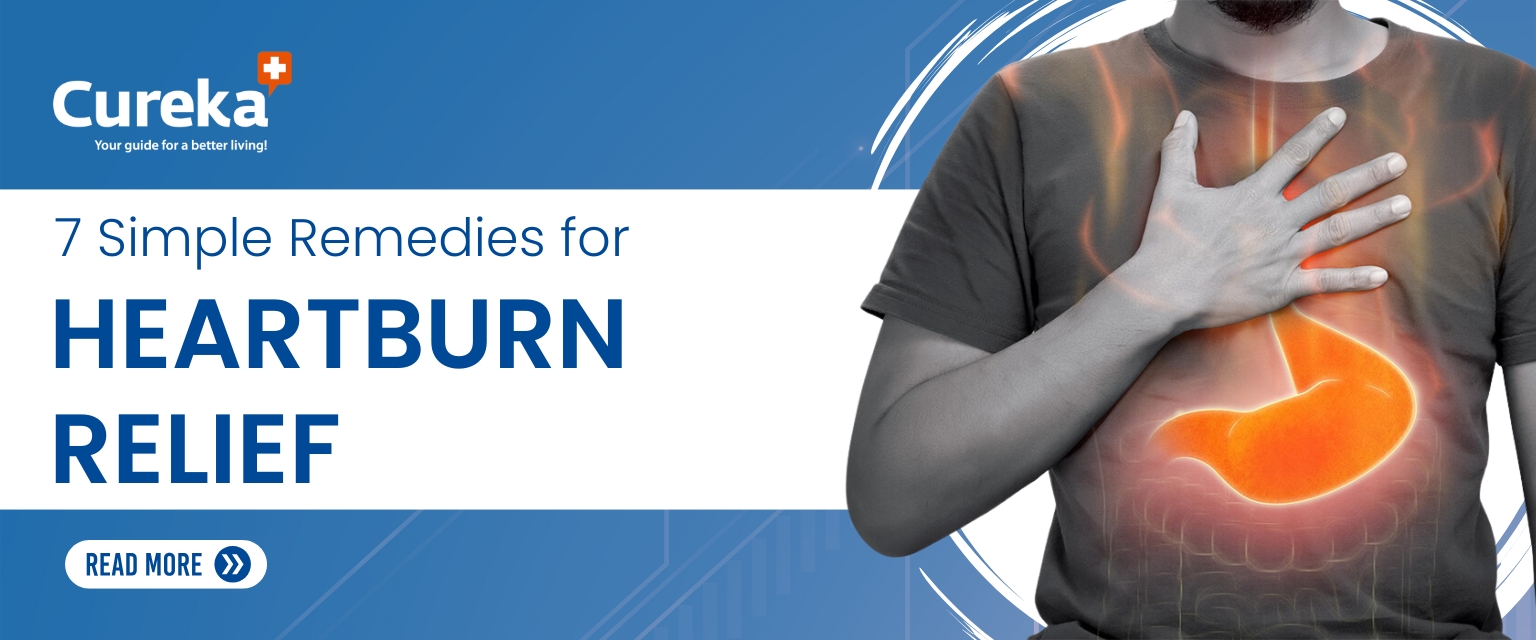7 Simple Remedies for Heartburn Relief
Heartburn, also known as acid reflux, is a common condition that affects many people at some point in their lives. It occurs when stomach acid backs up into the esophagus, causing a burning sensation in the chest, sour taste in the mouth, and even difficulty swallowing. While heartburn can be triggered by a variety of factors like diet, lifestyle, or medical conditions, there are several simple home remedies for acidity that can provide quick relief. In this blog, we will explore seven effective and easy heartburn home remedies that can help soothe the discomfort and prevent future flare-ups.
What Causes Heartburn and What Does It Feel Like ?
Heartburn occurs when the lower esophageal sphincter (LES), the muscle ring that separates the stomach from the esophagus, relaxes abnormally. This allows stomach acid to travel back up into the esophagus, which isn’t equipped to handle the acidic contents. As a result, heartburn symptoms such as a burning sensation in the chest, pain that rises towards the throat, and a bitter or sour taste in the mouth occur. Some common triggers include consuming spicy or acidic foods, alcohol, chocolate, caffeine, smoking, and being overweight.
1.Keep a Food Journal and Avoid Trigger Foods
One of the best ways to manage heartburn is by identifying and avoiding trigger foods. Certain foods and drinks, such as spicy dishes, caffeine, alcohol, and high-fat items, can weaken the LES and make heartburn more likely. Keeping a food journal allows you to track what you eat and how it affects your symptoms. Once you pinpoint your triggers, you can take steps to reduce or eliminate them from your diet, providing immediate relief and preventing future discomfort.
2.Avoid Lying Flat Right After Eating
It might be tempting to lie down after a big meal, but doing so can worsen heartburn symptoms. When you lie flat, the gravity that normally helps keep stomach acid down is eliminated. This makes it easier for acid to travel back up into your esophagus, leading to discomfort. To prevent this, avoid lying down within 2-3 hours after eating. Give your stomach time to digest the food, and you’ll have a better chance of avoiding a heartburn flare-up.
3.Resist the Urge to Overeat or Eat Quickly
Overeating and eating too quickly are major contributors to heartburn. When you consume large meals, your stomach has to work harder to digest, which increases pressure on the LES, making acid reflux more likely. Slow down and take smaller bites, chewing your food properly. Also, try to avoid large meals before bedtime. Eating smaller portions and not rushing through your meals can reduce the likelihood of heartburn and provide better digestion.
4.Take Steps to Lose Weight
If you’re overweight, the extra weight around your abdomen can put pressure on your stomach, pushing acid up into the esophagus. Losing weight through a balanced diet and regular physical activity can significantly reduce your risk of heartburn. Aim for 150 minutes of physical activity per week, and focus on eating foods that promote digestion and reduce acid reflux. Even modest weight loss can make a noticeable difference in heartburn severity.
5.Elevate the Head of Your Bed
When heartburn strikes, it can be difficult to get comfortable enough to sleep. However, sleeping in a flat position can exacerbate acid reflux. Elevating the head of your bed by 6-8 inches can help prevent acid from backing up into your esophagus while you sleep. You can achieve this by placing blocks under the head of your bed or using a foam wedge pillow. This simple adjustment can provide relief and help you sleep better at night.
6.Adjust Your Sleep Position
Sleeping on your left side might help alleviate heartburn symptoms. Studies suggest that left-sided sleeping can reduce acid reflux and promote better digestion. This position helps keep the stomach lower than the esophagus, making it harder for stomach acid to flow back up. If you find it hard to change your sleeping position, consider using a wedge pillow to help keep your body at an angle that reduces reflux.
7.Wear Loose-Fitting Clothing
Tight-fitting clothing, especially around the waist and abdomen, can increase pressure on the stomach, which may contribute to acid reflux and heartburn. Tight belts, high-waisted pants, or restrictive clothing can push stomach acid upwards, worsening your symptoms. Opt for loose, comfortable clothing to prevent unnecessary pressure on your stomach. This simple adjustment can provide immediate relief and reduce the risk of heartburn throughout the day.
Natural Herbs for Heartburn Relief
Herbs have long been used to soothe digestive discomfort, and many can offer effective relief from heartburn. Here are some of the best herbs to include in your natural heartburn remedy arsenal:
Ginger : Known for its anti-inflammatory properties, ginger can help reduce nausea and calm the stomach. It promotes better digestion and can prevent the buildup of stomach acid. You can drink ginger tea or chew a small piece of fresh ginger to help ease heartburn.
Licorice : Licorice root has been used for centuries to treat digestive issues, including heartburn. It can help protect the stomach lining and esophagus, reducing irritation caused by stomach acid. However, it’s important to use deglycyrrhizinated licorice (DGL), which has had the harmful compound removed, to avoid potential side effects such as high blood pressure.
Papaya : Papaya contains an enzyme called papain that aids in digestion and can help relieve bloating and indigestion. Eating fresh papaya or drinking papaya juice may help prevent acid reflux and ease heartburn symptoms.
Chamomile : Chamomile has soothing properties that can calm the digestive tract and reduce inflammation. Drinking chamomile tea can help relax the muscles of the digestive system and alleviate discomfort caused by heartburn.
Turmeric : Turmeric, with its active compound curcumin, has anti-inflammatory effects that can help soothe the digestive system. It can reduce the irritation caused by acid reflux and help prevent future flare-ups. You can incorporate turmeric into your diet through teas or smoothies for added digestive support.
Drink Plenty of Water : Staying hydrated can help keep your digestive system functioning properly and reduce heartburn symptoms. Drink plenty of water throughout the day, but avoid drinking too much during meals, as it may dilute stomach acid and slow down digestion.
When to See a Doctor
If your heartburn is frequent or severe, it may indicate an underlying condition, such as gastroesophageal reflux disease (GERD). Over-the-counter antacids can help with occasional heartburn, but if your symptoms persist or worsen, it’s important to consult a healthcare professional. Seek medical attention if you experience any of the following:
* Heartburn that occurs more than twice a week
* Difficulty swallowing or pain while swallowing
* Vomiting, especially with blood
* Unexplained weight loss
* Chest pain or discomfort that does not go away
Conclusion
Heartburn can be an uncomfortable and disruptive condition, but there are many simple heartburn remedies that can help manage and prevent it. By keeping track of your triggers, making lifestyle changes, and incorporating natural remedies like ginger and aloe vera, you can enjoy immediate heartburn relief and prevent future flare-ups. If your symptoms are severe or persistent, don’t hesitate to consult a healthcare professional for further guidance.
References :
1. Effectiveness of Nutritional Ingredients on Upper Gastrointestinal Conditions and Symptoms: A Narrative Review – 2022 FEB – https://pmc.ncbi.nlm.nih.gov/articles/PMC8839470/











